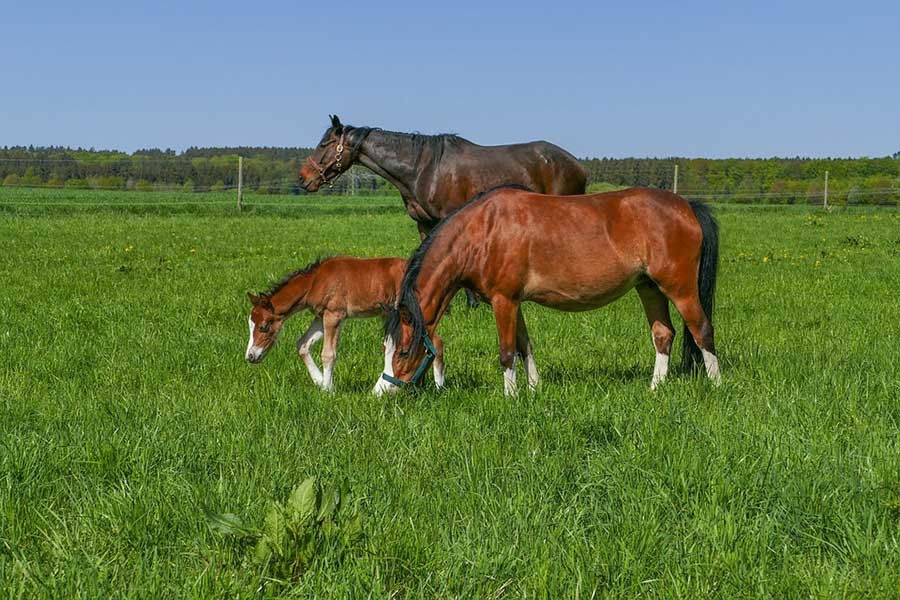
by Dr. Eleanor Kellon
Vitamin C [ascorbate/ascorbic acid] is a water-soluble vitamin that functions as an important antioxidant and is needed for the synthesis of L-carnitine, catecholamines like epinephrine and dopamine, as well as collagen, the major protein in all connective tissues, including tendons and ligaments, even blood vessels. Deficiency causes a disease called scurvy, beginning as weakness and muscle pain, progressing to bleeding gums, loose teeth, poor healing and eventually mental changes and death.
Unlike humans, the horse can synthesize enough vitamin C in its body to prevent the development of a full-blown deficiency state (scurvy). However, the ability of this synthesis to maintain normal vitamin C levels and the role of dietary C is poorly understood. We do know that heavy exercise and chronic disease, especially lung disease, lead to decreased vitamin C blood levels in unsupplemented horses, as does stabling versus pasture access. Low blood levels have also been linked to poor wound healing in horses.
Although information is limited, a “conditionally essential” status may best describe the need for additional vitamin C in the diet of horses that are recovering from illness or surgery, or exercising heavily, when requirements may exceed the body's ability to make it. The NRC states that information about vitamin C levels in common feedstuffs is lacking, but a study from 1938 measured ascorbic acid in many common feeds, hays and references levels in grasses.
The figures are presumably on a dry matter basis and they report 20 to 136 mg/100 gram in fresh pasture; 1.3 mg/100 g in 50:50 alfalfa/grass hay; 0.9 mg/100 g in grass hay; 1.3 to 1.8 mg/100 g in alfalfa; 0.7 mg/100 g in beet pulp; about 0.6 mg/100 g in grains (this would only apply to whole grains). A stabled horse on a grass hay-based diet would be taking in less than 1 gram of C from its diet daily while an average horse on pasture is getting a minimum of 20 grams per day (quite possibly part of the value of “Dr. Green”!).
In the early 1970s, Dr. Linus Pauling was recommending mega-doses of vitamin C for maximum health and disease prevention. As usually happens, many of these claims were debunked and the pendulum actually swung so far to the other side, that mega-dosing was proposed to be toxic. Once again, the truth is somewhere in between.
With specific reference to the horse, toxicity in the form of diarrhea usually begins with dosages of 20 grams per day and above. This may be more of a local irritation than a toxicity. There are two other properties of vitamin C that would dictate caution in horses known or suspected to be iron overloaded. One is that vitamin C increases iron absorption in the intestine. It also can act as a pro-oxidant rather than anti-oxidant in the presence of excess iron in the circulation or tissues.
A reasonable level of supplementation is 3 to 10 grams per day for an average size adult horse, keeping to the lower levels with iron overload. For additional antioxidant support vitamin C can be combined with other antioxidants such as resveratrol from grapeseed, citrus bioflavonoids, MSM, herbals with good antioxidant activity such as Jiaogulan or Spirulina and vitamin E for fat soluble coverage.
Uckele Health & Nutrition, maker of CocoSoya®, offers supplements that provide vitamin C and antioxidants.
Vitamin C is a concentrated antioxidant for immune support and function, especially for horses not on fresh pasture. It promotes the body’s innate resistance to pathogens and protects against damaging free radicals to maintain a healthy inflammatory response.
Bio Quench supports horses with seasonal allergies. With natural antioxidants to help promote the immune system and provide protection from excessive oxidation that can generate free radicals. With a potent blend of plant antioxidants, antioxidant vitamins and B vitamins for optimal immune enhancing effects.
Lung EQ promotes overall equine respiratory, lung and immune health for horses with respiratory reactions to environmental irritants and seasonal allergens. With Spirulina Platensis which may help stabilize the mast cells that release histamine. MSM supports normal regulation of inflammation. Flaxseed meal promotes balanced inflammatory pathways. Jiaogulan supports healthy histamine levels, open airways, and healthy immune response.
About the Author - Dr. Eleanor Kellon, staff veterinary specialist for Uckele Health & Nutrition, is an established authority in the field of equine nutrition for over 30 years, and a founding member and leader of the Equine Cushings and Insulin Resistance (ECIR) group, whose mission is to improve the welfare of horses with metabolic disorders via integration of research and real-life clinical experience. Prevention of laminitis is the ultimate goal. www.ecirhorse.org.
Uckele Health & Nutrition, maker of CocoSoya, is an innovation-driven health company committed to making people and their animals healthier. On the leading edge of nutritional science and technology for over 50 years, Uckele formulates and manufactures a full spectrum of quality nutritional supplements incorporating the latest nutritional advances. www.uckele.com.
This article originally appeared on Uckele.com and is published here with permission. Find more interesting articles in our section on Health & Education.

































